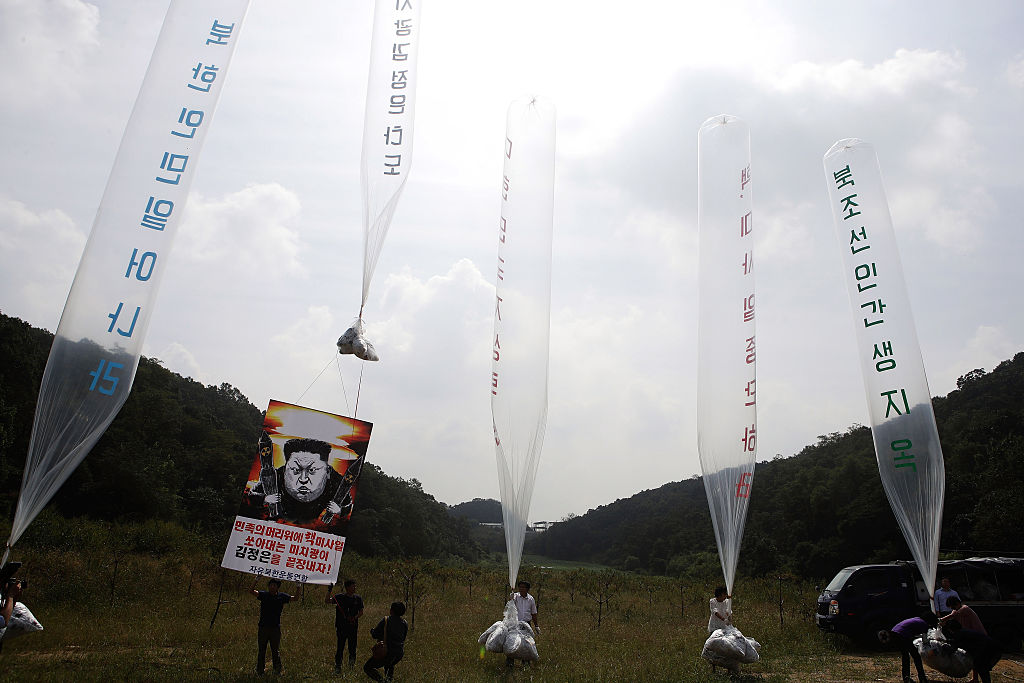North Korea is finally delivering on its promise, although with an unusual payload. After warning South Korea that it would scatter “mounds of wastepaper and filth” on Sunday in retaliation for the anti-North leaflets that activists in the South regularly send floating north across the border, Pyongyang dispatched more than 260 balloons carrying bags of excrement and waste back the other way.
This unusual display of discontent was not unprecedented. In 2016, North Korea sent balloons full of waste and cigarette butts south after calling the South’s conservative President Park Geun-hye “human trash.” South Korean liberal presidents have sought to discourage activists from sending leaflets to the North for fear of damaging inter-Korean engagement. But conservative ones have condoned the practice as a way of demonstrating their resolve to stand against North Korea.
Although South Korean leaflets pose little military threat, from the North Korean perspective, they violate the country’s sovereignty and affirm the South’s hostile intentions towards its communist neighbour. Pyongyang called time and again for an end to leafleteering, and when these efforts have failed, decided to retaliate.
It is important to not dismiss North Korea’s threat over the leaflets as cheap talk.
In 2020, Pyongyang attributed the closure and destruction of the inter-Korean liaison office in Kaesong to a group of South Korean activists sending anti-Pyongyang leaflets northward. The North’s upset prompted the South’s Moon Jae-in administration to prohibit the dissemination of leaflets in a bid to avoid escalation. In 2022, North Korea sought to blame South Korean leaflets for bringing the coronavirus into the country. And last year, when the South Korean Constitutional Court declared Moon’s leaflets ban to be unconstitutional, North Korea threatened to “go beyond the conventional response” and punish South Korea with force.
It is important to not dismiss North Korea’s threat over the leaflets as cheap talk. In 2012, North Korea threatened to open fire against South Korea if Seoul did not block activists from sending the balloons. Seoul took the threat seriously and sealed off the balloon launching area. In 2014, North Korea used its antiaircraft machine guns to shoot down balloons and even fired at South Korean positions close to the border. The North’s actions led to a brief exchange of fire with the South Korean military, which fortunately did not result in any casualties. North Korea several times conditioned the resumption of talks on Seoul stopping activists from sending the leaflets, most notable of those being the inclusion of the anti-leaflet clause in the 2018 Panmunjom Declaration.

North Korea’s means of retaliation to the most recent distribution of leaflets may have been unconventional, but it also demonstrates that North Korea is conflict-wary, even in the increasingly polarised regional security environment. Pyongyang could have responded with gunfire like it did in 2014 to demonstrate that it is ready for war. Such a response might have even made sense, given leader Kim Jong-un this year dropped unification as a goal and begun to call South Korea the “principal enemy”. But by instead responding with non-military means, North Korea sends a message to South Korea that it only wants the South to stop the leaflets, rather than escalation.
North Korea would not benefit from launching an attack against South Korea any time soon. Shunning engagement with Seoul simply means Pyongyang is reorienting its priorities elsewhere, particularly towards developing its national economy. After dropping the unification goal, Kim is doubling down on his promise to build new factories in 20 counties each year over the next decade under his “Regional Development 20×10 Policy.” Kim recognises that he needs to win back loyalty from the population due to the growing inequality between the urban and the rural areas. Kim wants to increase the rural living standard, tighten the central government’s control over the market, and crackdown on “anti-socialist” behaviour in the process. Recently finished regional factories such as one in Kimhwa County will produce consumer goods and daily necessities. North Korea broke ground on six regional factories earlier this year.
Pyongyang is also sending more labourers to Russia and China to earn cash for the regime. Russia’s veto against extending the mandate of a United Nations panel monitoring sanctions on North Korea allows the country to further export ammunitions in exchange for Russian raw materials and foodstuffs with little international condemnation. At the same time, North Korea maintains that it does not supply Russia with ammunition, seeking to avoid increasing tension with the United States and South Korea. China is also helping North Korea, the two countries agreeing last month to ease customs-related quarantine measures. The move will help North Korea gain access to raw materials for its construction of factories.
North Korea’s balloons full of excrement may “go beyond the conventional response”, but fortunately the tactic connects with several other indicators that suggests making money rather than making war is at the top of North Korean to-do list. South Korea’s reaction will determine North Korea’s next step. It is important that Seoul does not up the ante and force Pyongyang to look further beyond the conventional response.

